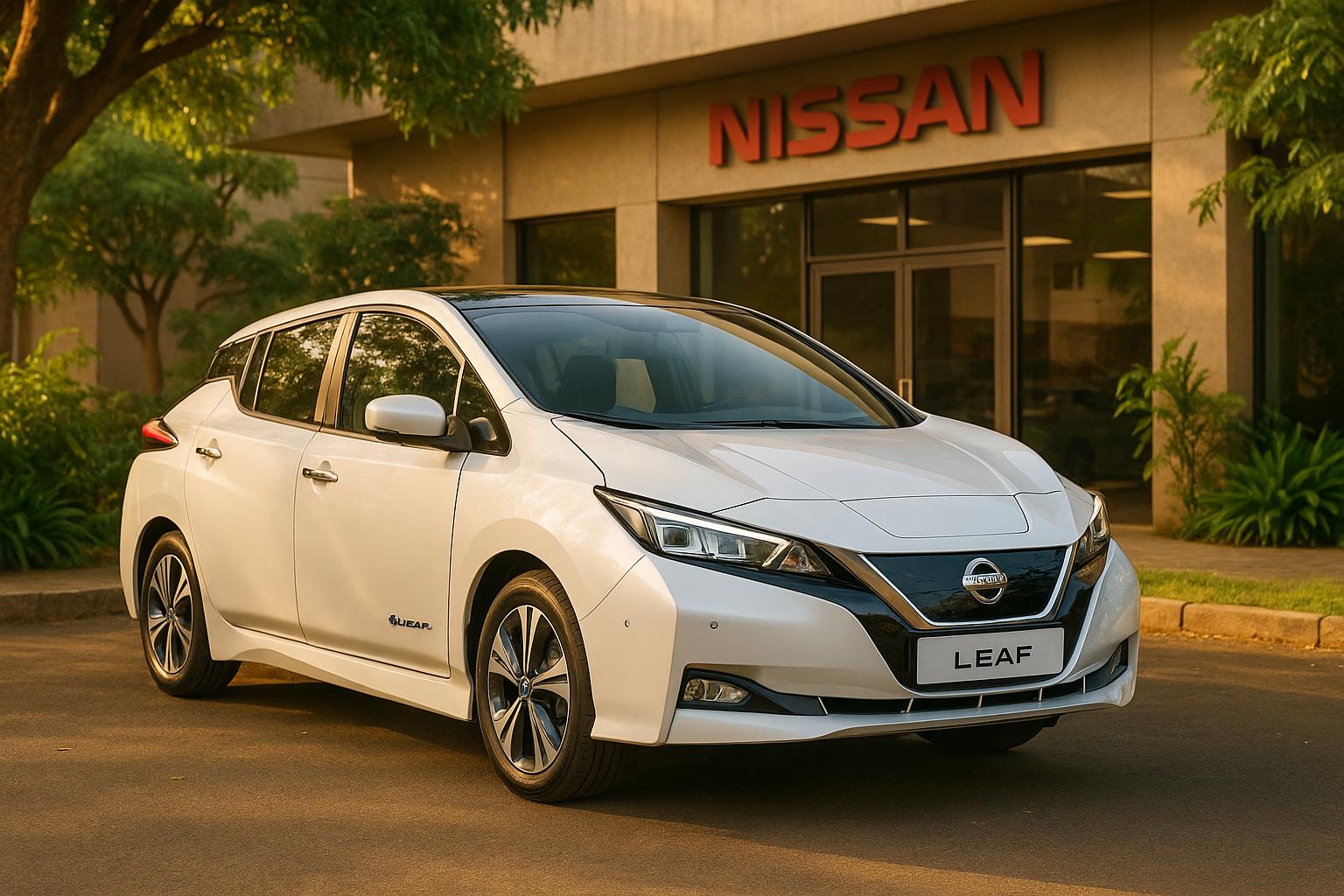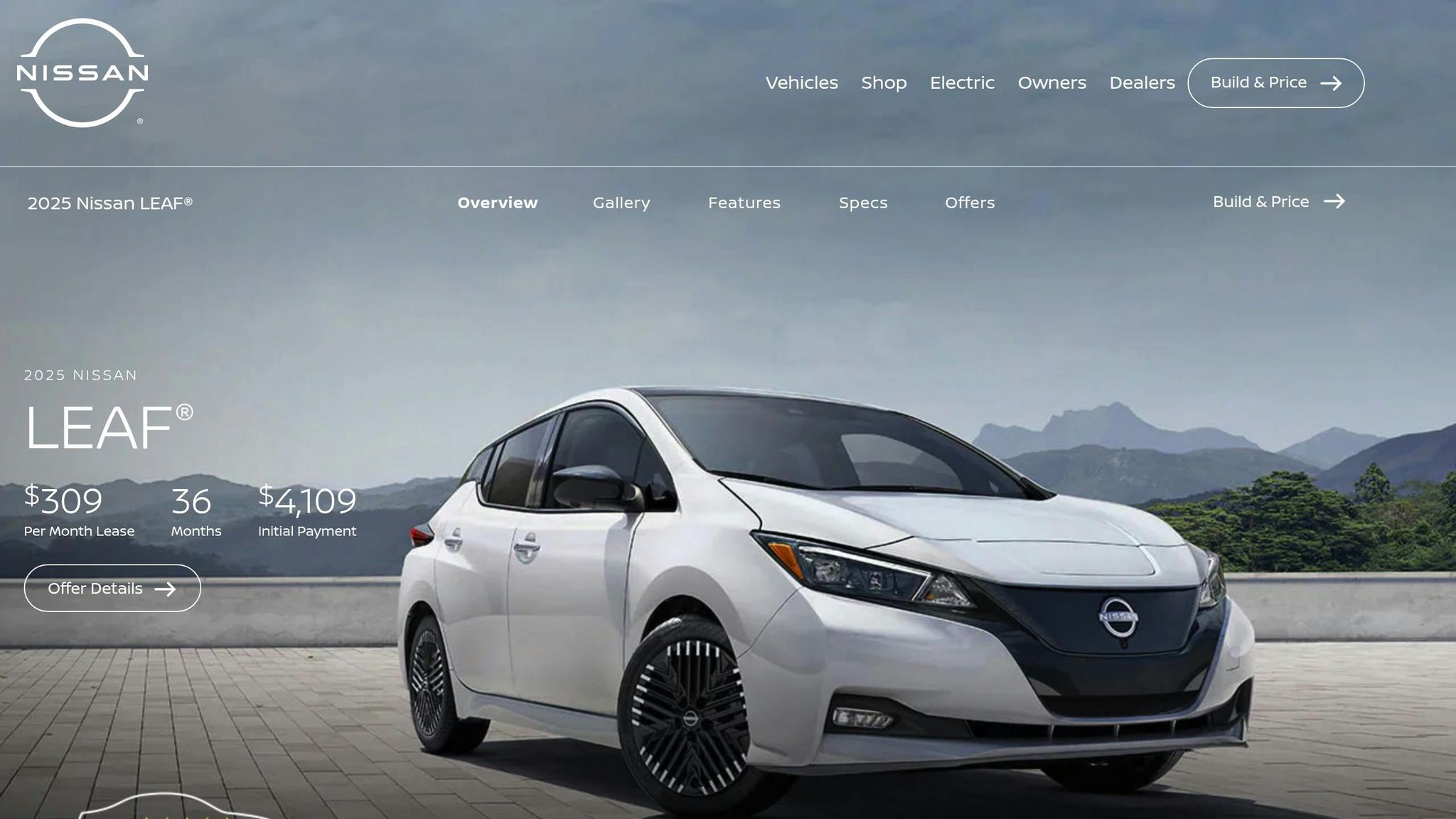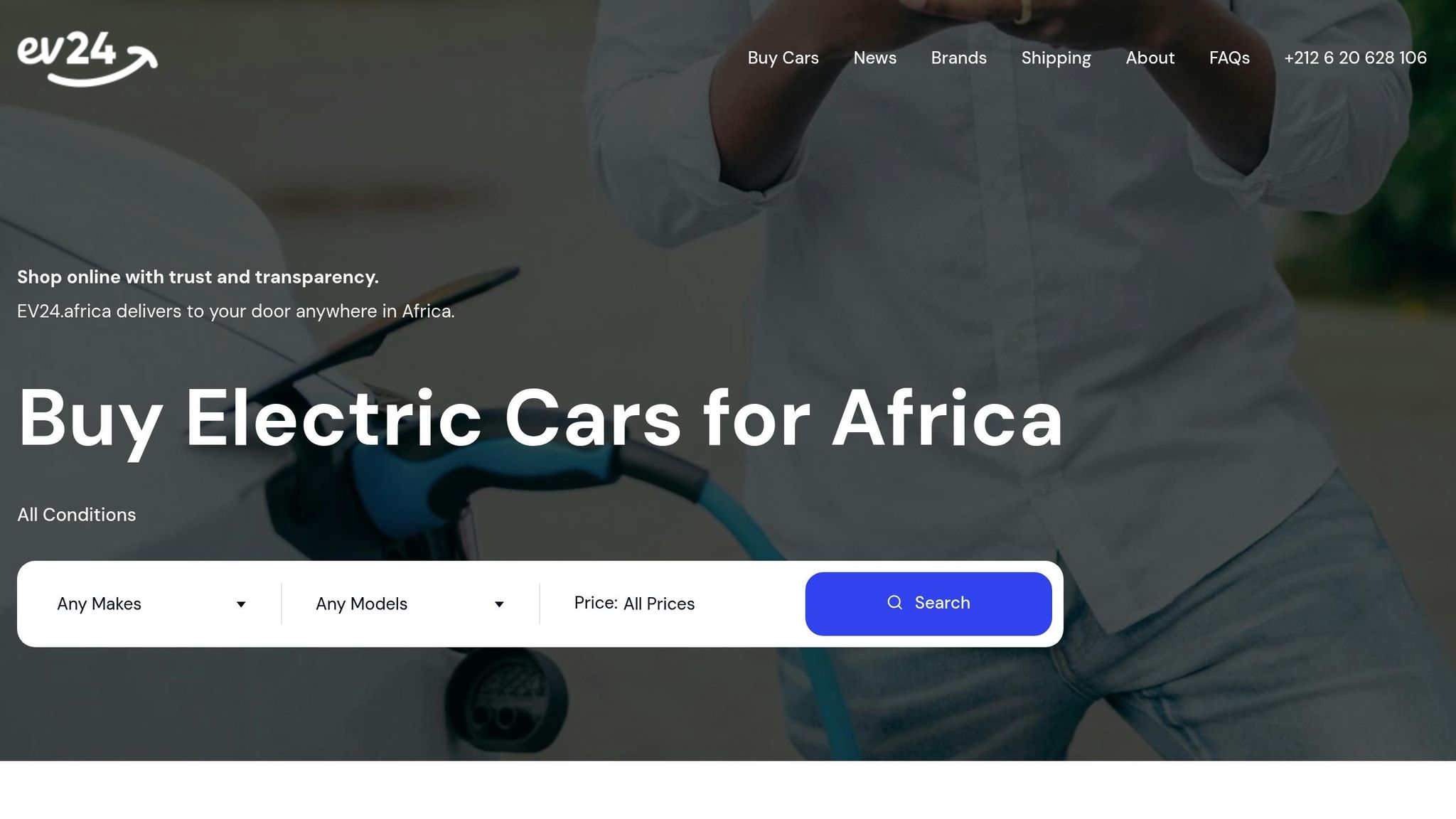
The Nissan Leaf is now a popular electric vehicle option in Africa, offering reliable performance and affordability. Buyers can purchase it through authorized dealerships or the online platform EV24.africa, which simplifies the process by managing logistics, financing, and delivery across all African countries. Prices vary by region due to factors like import duties, taxes, and government incentives. Key cities such as Nairobi, Lagos, and Cairo are seeing growing interest in the Leaf, thanks to its low running costs and suitability for urban driving.
Quick Facts:
- Where to Buy: Authorized Nissan dealerships or EV24.africa.
- Pricing Factors: Import duties, taxes, shipping costs, and local incentives.
- Highlights: Low maintenance, stable electricity costs, and flexible financing options.
If you’re considering the Nissan Leaf, research your country’s import rules, available tax incentives, and charging infrastructure to plan your purchase effectively.
A Practical Electric Car in Kenya | Nissan Leaf Review

Where to Buy the Nissan Leaf in Africa
If you’re looking to purchase a Nissan Leaf in Africa, you have two main options: authorized dealerships or the online platform EV24.africa.
Authorized Nissan Dealerships
In Kenya, the official Nissan Kenya website (nissankenya.com) doesn’t currently list the Nissan Leaf among its available models. Instead, it focuses on vehicles like the Magnite, Terra, Patrol, Navara Single Cab, Navara Double Cab, NV350 Urvan, and Qashqai. For those in Kenya hoping to buy a brand-new Nissan Leaf, special orders may be required due to limited availability in local dealership inventories.
If you’re having trouble finding the Nissan Leaf through dealerships, an alternative option is EV24.africa, which simplifies the buying process for electric vehicles across the continent.
Buying on EV24.africa

EV24.africa is an online marketplace tailored for electric vehicle buyers in Africa. The platform features both new and used Nissan Leafs, complete with detailed information like transparent pricing, battery health reports, and charging specifications. Financing options are available, offering competitive interest rates and flexible repayment plans.
What sets EV24.africa apart is its comprehensive service. They manage logistics such as customs, shipping, and vehicle registration, ensuring delivery to all 54 African countries. Additionally, their team of experts is on hand to assist with everything from choosing the right model to securing financing and handling post-purchase maintenance.
Nissan Leaf Prices Across Africa in 2025
The pricing details for the 2025 Nissan Leaf are not yet available, but it’s clear that costs will vary across regions due to factors like import duties, taxes, and shipping expenses. These regional differences play a big role in determining the final price, making it essential for potential buyers to understand the landscape before making a decision.
Regional Price Variations
Several factors shape the cost of the Nissan Leaf across Africa. In Southern Africa, higher import duties and taxes often drive up prices. Meanwhile, Eastern Africa enjoys policies aimed at keeping costs more manageable. In Western Africa, currency fluctuations could lead to unpredictable pricing. For buyers navigating these differences, having access to tailored financing options can make the purchasing process smoother and more accessible.
The third-generation Nissan Leaf, manufactured at Nissan’s Sunderland plant in the UK, began production in June 2025. Orders will open in autumn 2025, with the first deliveries expected in spring 2026.
Financing Options on EV24.africa
To help address regional price disparities, EV24.africa offers financing solutions designed to ease the burden on buyers. Partnering with local financial institutions, the platform provides financing in local currencies and trade-in programs to reduce upfront payments. These options also help buyers manage risks associated with fluctuating exchange rates.
As new pricing details become available, EV24.africa will continue to share updates, ensuring buyers have the information they need to make well-informed decisions.
sbb-itb-99e19e3
How to Buy a Nissan Leaf in Africa
Buying a Nissan Leaf in Africa involves more than just picking a car and paying for it. You’ll need to navigate local regulations, understand import requirements, and factor in taxes. Each country has its own rules, so planning ahead is essential.
Steps for Purchasing
Step 1: Start by researching your country’s import duties and tax incentives. These can significantly impact your budget. For instance, in South Africa, electric vehicles are subject to a 25% import duty, along with luxury taxes and VAT, all calculated based on the car’s value. This makes EVs pricier than in countries with emission-based tax systems.
Step 2: Gather all necessary documents, like valid identification, proof of income, and import permits. Some nations have simplified the process for electric vehicles. Ethiopia, for example, banned petrol and diesel car imports in early 2024, allowing only electric vehicles – a move that reportedly led to 100,000 EVs entering the market.
Step 3: Decide where to buy your Nissan Leaf. Platforms like EV24.africa streamline the process by handling paperwork, verifying your identity, and even arranging financing in local currencies through partnerships with regional financial institutions.
Step 4: Once your purchase is finalized, arrange for payment and delivery. EV24.africa provides flexible financing options and manages shipping across all 54 African countries, offering tracking and regular updates to keep you informed.
Ownership Costs
Owning a Nissan Leaf isn’t just about the upfront cost. You’ll need to consider ongoing expenses like charging infrastructure, maintenance, and insurance.
- Charging Costs: While urban areas in South Africa, Kenya, and Morocco have growing charging networks, rural areas may require you to invest in home charging solutions, adding to your initial costs.
- Maintenance: The Nissan Leaf generally has lower maintenance costs compared to traditional vehicles due to fewer moving parts. However, battery replacement after the warranty expires can be a significant expense. Check the warranty details and local support options before buying.
- Insurance: Electric vehicle insurance premiums can be higher than those for conventional cars, often due to the vehicle’s value and the need for specialized repairs. Compare insurance options to find the best coverage for your needs.
- Service Centers: Make sure there are authorized Nissan service centers nearby to ensure proper warranty coverage and access to genuine parts.
Buyer Tips
To make your purchase smooth and avoid common pitfalls, keep these tips in mind:
- Use trusted channels: Only buy through verified platforms to ensure legitimate transactions and proper documentation.
- Check the warranty: Confirm that your Nissan Leaf has valid international warranty coverage applicable in your country. Some imported vehicles may have region-specific restrictions.
- Double-check documents: Ensure all paperwork – like titles, import permits, and compliance certificates – is accurate. For instance, in Zimbabwe, import duties on EVs dropped from 40% to 25% starting January 1, 2025, so make sure you’re charged the correct rate.
- Look at the big picture: Don’t just focus on the purchase price. Factor in costs for charging infrastructure, insurance, and potential battery replacements to avoid surprises later.
- Mind currency issues: Currency fluctuations can affect both the purchase price and financing terms. Platforms like EV24.africa offer local currency financing, making payments more predictable. With EV sales in Africa more than doubling to nearly 11,000 units in 2024, these considerations are increasingly important.
Conclusion
The Nissan Leaf is now available across Africa through a variety of purchasing options, each with its own perks. Whether you go through authorized dealerships, import directly, or explore online platforms, being informed about local pricing and the steps involved – like those outlined earlier – can help you make the most of your purchase.
One standout option is EV24.africa, which is described as "The first online marketplace to buy electric cars for Africa". This platform simplifies the process by handling paperwork, financing, and delivery, making it easier for buyers to overcome traditional hurdles to owning an electric vehicle.
Additionally, EV24.africa offers flexible financing and clear pricing, helping to manage the overall cost of ownership. As the electric vehicle market grows across Africa, your success in purchasing a Nissan Leaf will hinge on understanding local rules and choosing reliable channels that provide proper documentation and warranty support.
FAQs
What factors influence the price of a Nissan Leaf across Africa?
The cost of a Nissan Leaf in Africa varies based on several important factors like import duties, value-added taxes (VAT), and government incentives. Countries with steep import taxes or minimal subsidies tend to have higher prices.
Other considerations include shipping fees and the presence of charging infrastructure. In regions where charging stations are scarce or transportation costs are high, prices may rise further. Local tax regulations and fluctuations in currency exchange rates also play a big role in determining the final price of the vehicle.
How does EV24.africa make it easier to buy a Nissan Leaf in Africa compared to traditional dealerships?
EV24.africa makes purchasing a Nissan Leaf incredibly straightforward with its fully online platform. This service takes care of everything – from import logistics to customs clearance and delivery – typically within a 4 to 8-week timeframe. No more wasting hours visiting physical dealerships.
What sets EV24.africa apart is its commitment to simplicity and transparency. They offer clear pricing, detailed vehicle information, and an easy-to-navigate ordering system. By focusing on convenience, they’ve made owning an electric vehicle in Africa a smooth and stress-free experience.
What should buyers in Africa know about charging and maintaining a Nissan Leaf?
Africa is steadily expanding its EV charging infrastructure, with more fast-charging stations and nationwide networks being set up to support longer journeys. The Nissan Leaf stands out with its 11 kW AC charging capacity and vehicle-to-load (V2L) functionality, features that can simplify charging and potentially reduce costs in certain areas.
When it comes to maintenance, the Nissan Leaf is easier on the wallet compared to traditional gas-powered cars, with costs averaging around $0.06 per mile. That said, some regions may face challenges like limited local expertise and parts availability, which could lead to higher costs or longer repair times. By planning ahead for both charging and maintenance, owners can enjoy a smoother and more budget-friendly experience.




